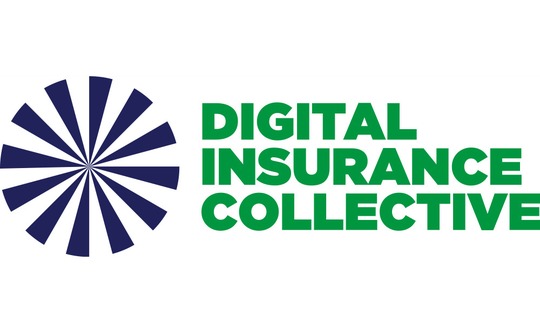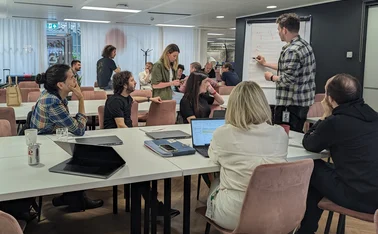
Six insurtech start-ups to watch in 2017

To celebrate the return of the Post Digital Insurance Collective, I thought I would take another of my periodic looks at some of the newer start-ups in the insurtech space with some connection to the UK.
At the start of 2016 I focused on the likes of Brolly, Digital Risks, Trov and Wrisk; while last summer I broke up my blog into two: one covering Kasko Konsileo and Spixii and the other Insure Street, Teambrella and Tego Cover.
I mention this because Tahir Farooqui, the founder of Insure Street, will be one of the presenters at the first Digital Insurance Collective meeting of 2017 on 10 March at Bounce, Farringdon, alongside Swiss Re's Astrid Frey Kaufmann and RSA's Peter Townsend.
I was also encouraged to seek out some of the new insurtech kids on the block by the recent Disruption Trends report by Tällt, which claimed that $1.69bn (£1.35bn) had been invested in this sector in 2016, a 32% increase year on year.
Maybe these firms below will come to speak at future Collective meetings. Perhaps they will feature prominently in another Y-O-Y rise in insurtech investment. Whichever the case, they will certainly be worth watching over the coming months.
The pitch
"The world's most personalised insurance. We use next-generation data science for high-quality risk selection"
What we know
The holding website for Arowana is very soothing to watch, but does not give much away. A look at the business' Facebook page does not reveal much more either, other than the business is making a motor insurance play.
That probably comes as no surprise given that the insurance firm's co-founder and CEO Brigitte Small spent five years at Admiral between 2008 and 2013 in roles including business development manager and products and marketing director.
Small and her business partner/CTO Farid Tejani have more recently both worked at consultancy firm Ampersand.
Other than that, it is evident that Arowana is very much a technology driven business, using data science and machine learning to generate what it claims will be "market outperforming loss ratios".
Let's hope a little of former boss Henry Engelhardt's magic dust has rubbed off on Small and she achieves big things with the business.
The pitch
"Taking the gambling out of insurance"
What we know
Following the recent success of British cycling at the Olympics and Tour de France, it is perhaps no surprise that there has been a boom in start-ups looking for love from lycra-clad racers and leisurely pedallers.
Adding to Bikmo and Pedal Cover - to name two new entrants - we now have Insure A Thing, a business that is currently associated with accelerator Start-Up Boot Camp Insurtech London.
In truth, IAT does look to have broader plans than cyclists given its mantra to "protect the things you love - without the fine print, without the tricks", but in order to get into at least second or third gear, this is the market it has decided to saddle up into first.
One of the most interesting aspects of IAT is its view that "paying premiums upfront is old-fashioned". Instead it claims it will "trust the customer and ask for payments in arrears, after claims were settled".
For more detail on how this model works, founder and CEO Tobias Taupitz has penned two blogs: Solving the conflict of interest in general insurance Part One and Two.
In these blogs, Taupitz outlines how the start-up - which is to be modelled like an managing general agency - will work on a "cost plus model", noting that despite traditional peer-to-peer models sharing some of IAT's views on how the present model is broken, if premiums are paid back in parts at the end of the year, "it simply means that too much was taken from the customer in the first place".
Instead, he comments: "We firmly believe we should work with our customers on risk prevention and enable them to benefit from the upside. The less claims that occur in a month, the less the affinity group will have to pay. A group's behavior directly correlates with their payments.
"Even better, to minimise the amount of free-riders, we will introduce an implicit no claims bonus: stay claims free for a while and move up to a pool with similar conscientious people who claim less, resulting in lower payments."
With regards to managing the balance sheet, Taupitz, who has previously worked in transaction services at KPMG and the financial institutions group at Barclays, concludes: "Yes, payment in arrears will result in a credit risk that needs to be managed. With deep expertise from the credit card and lending space, however, this is more than feasible."
In terms of its chances of success, "things" look positive for IAT given Taupitz's co-founder Jens Hartwig has worked at Start-Up Boot Camp since 2014, including over a year as chief operating officer at Start-Up Boot Camp Insurtech London, a role he gave up to get in tandem with Taupitz.
The pitch
"Lendy is a new way to drive. We help you borrow cars from friends for whatever life throws at you"
What we know
Motor manufacturers are taking a closer interest in insurtech, as shown last year when Wrisk was selected as one of five finalists to join the BMW Innovation Lab, described at the time as the "first ever fintech business incubator in the automotive sector".
Well, that might be true but In Motion Ventures, the new venture capital arm of Jaguar Land Rover, is also showing an interest in fintech too, given its support for Lendy, a pre-launch insurtech start-up that is seeking to bring temp cover to the phone.
Launched in 2016, In Motion Ventures aims to invest in "high-growth companies in the mobility and smart transportation sector" at all stages from Seed to Series B. In conjunction, its London-based accelerator programme plans to offer pre-seed investment and hands-on support to 10-15 early stage start-ups every year.
One of these, Lendy claims that it is "re-inventing traditional products and user experiences to meet the needs of the sharing economy". Starting with short-term car insurance from as little as an hour, its unique selling proposition is to help drivers to get insured on someone else's car in less than 60 seconds, directly from their phone.
As things stand today, there is not a lot of information about Lendy - or whether it is indeed still a going concern given its social media links are currently not working - other than Karin Nielson has been chosen as "interim CEO" and that she has a track record in start-ups, having previously been co-founder and CEO of Fluently, the self-proclaimed world's first SaaS-enabled translation marketplace.
However, as a possible sign of what is to come, last month In Motion Ventures participated in a $1m seed round for US-based start-up Go Kid, a mobile-first platform enabling secure and convenient ridesharing for schools, after-school activities and active families, making it easy for parents to schedule and manage trips for their children within their trusted networks.
The short-term motor market is one to watch, as indicated by Cuvva's recent £1.5m funding round led by Local Globe and Hambro Perks-backed Just Miles. With Jaguar Land Rover's backing, could Lendy - or something else similar from In Motion Ventures - emerge as the big cat in this burgeoning sector?
The pitch
"Tikkr is an on-demand digital insurance platform. Tikkr protects you and the things you care about for just the moment you need it. Goodbye multiple, long-term contracts. Tikkr's ultimate goal is to understand your lifestyle and then predict and protect your moments automatically."
What we know
Another business currently housed within Start-Up Boot Camp Insurtech London, despite being headquartered in Sweden, Tikkr is different to many of the niche plays here in that it is a multi-line business, covering everything from accident and health to life to possessions on an hourly basis.
Among the founding trio of Tikkr is the insurance expert Chintan Dhanji, who worked in South Africa for five years at Discovery Vitality and then Bain and Company, before returning to Los Angeles.
Also involved are Stockholm-based sales and operations specialist Hitesh Saini, who was previously CEO and co-founder of training and coaching start-up Innovea and an IT management consultant for Ericsson; and the technologist, simply known as Arun R, who has most recently split his time between India and Sweden with FTL Technologies.
If there is anything any of this trio have in common, it is that both Dhanji and Saini were educated at the IE Business School in Madrid, although they studied at different times.
5) Trade Creditech - trading as Cvrd
The pitch
A new B2B platform for SMEs to manage their trade credit exposure, insuring invoices against default, sentiment and ledger analysis, peer rating and client prospecting tools.
What we know
It would be fair to say that the insurtech space has its fill now of on-demand mobile solutions for Millennials.
This makes Cvrd a very different proposition, in that its USP is based on the presumption that while trade credit is important for those operating in the B2B space, SMEs do not have the same resources or time to devote to credit control as large corporates.
To combat this, Cvrd plans to use cloud accounting to provide free credit analysis of SME customers, as well as premium services such as customer prospecting tools and - the reason it is included here - trade credit insurance.
The brainchild of CEO Flemming Bengsten and co-founder Tanguy Hespel, the business hoped to start beta-testing before Christmas, promising "no whole book commitment, no minimum premium, no large upfront payment, just simple pay-as-you-go ledger insurance. Insure invoice by invoice, customer by customer or by risk band".
The pitch
"Urban Jungle is a new type of insurance business, focused on making people's lives less risky, and saving them money as a result. We've lived in numerous house and flat shares and know that most insurance just doesn't work for how young professionals live in the city. We're designing products specifically for people like you."
What we know
Created by two Cambridge University graduates, Urban Jungle might not sound like a traditional insurance company, but I think that is the point.
Co-founder and CEO Jimmy Williams spent seven years as a management consultant at OC&C where he latterly focused on financial services, insurance, business process outsourcing and infrastructure services, according to his Linkedin profile. His partner and chief technology officer Greg Smyth numbers Google and Facebook among his previous employers.
Another mobile-first insurance firm currently beta-testing, Urban Jungle is looking to produce an insurance policy where housemates can split the bill between themselves and change names if people move out, as well as offering protection for deposits and shared possessions.
The business is also promising "no sneaky T&Cs", policies written in plain English, no impractical exclusions, and claims resolved in hours not weeks, all through your smartphone, wherever possible.
Other than that, there is not much to add presently. The business is already producing some significant content giving advice for flat sharers on everything from keeping your home safe while you are away to choosing the right flat mate. Follow this - or do not claim - and Urban Jungle adds it will discount its monthly fee.
A bigger challenge might come not from differentiating itself from other insurance companies, but the other "Urban Jungles" out there, which includes everything from a fitness/nutrition company to a construction firm to a sneaker and street culture specialist.
Are you working on an insurtech start-up and want to be featured in Insurance Post? Please drop Jonathan Swift a line at jonathan.swift@incisivemedia.com OR @insuranceswifty on Twitter
Only users who have a paid subscription or are part of a corporate subscription are able to print or copy content.
To access these options, along with all other subscription benefits, please contact info@postonline.co.uk or view our subscription options here: https://subscriptions.postonline.co.uk/subscribe
You are currently unable to print this content. Please contact info@postonline.co.uk to find out more.
You are currently unable to copy this content. Please contact info@postonline.co.uk to find out more.
Copyright Infopro Digital Limited. All rights reserved.
As outlined in our terms and conditions, https://www.infopro-digital.com/terms-and-conditions/subscriptions/ (point 2.4), printing is limited to a single copy.
If you would like to purchase additional rights please email info@postonline.co.uk
Copyright Infopro Digital Limited. All rights reserved.
You may share this content using our article tools. As outlined in our terms and conditions, https://www.infopro-digital.com/terms-and-conditions/subscriptions/ (clause 2.4), an Authorised User may only make one copy of the materials for their own personal use. You must also comply with the restrictions in clause 2.5.
If you would like to purchase additional rights please email info@postonline.co.uk









